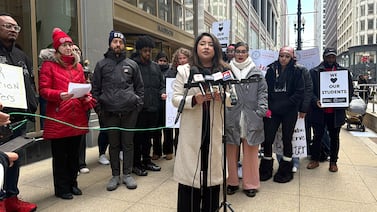Sign up for Chalkbeat Chicago’s free daily newsletter to keep up with the latest news on Chicago Public Schools.
Illinois’ schools chief pushed back against the Trump administration’s demand to certify that school districts are eliminating diversity, equity, and inclusion programs, saying the state is already in compliance with federal law.
In a letter on Wednesday, State Superintendent Tony Sanders challenged the U.S. Department of Education to prove which programs and activities violate federal civil rights law and to identify “illegal DEI” activities.
The U.S. Department of Education last week ordered state education officials to certify within 10 days that their school districts do not engage in any practices the administration says illegally promote diversity, equity, and inclusion, which it claims would violate Title VI of the Civil Rights Act of 1964, a federal law that prohibits discrimination on the basis of race, color, and nationality in programs that receive federal funding.
The administration threatened to pull federal funding from schools in states that failed to do so. Illinois would lose about $6.4 billion in federal funding if the administration follows through with its threat.
“We are concerned that USDOE seemingly seeks to change the terms and conditions of the Illinois State Board of Education’s award without formal administrative process,” Sanders wrote.
The Illinois State Board of Education already complies with Title VI and regularly submits “applications certifying compliance with all required assurances for federal programs, all of which have been approved by the U.S. Department of Education,” Sanders wrote.
He also noted that the administration’s current stance reflects an “abrupt shift” from its previous policy on diversity, equity, and inclusion and cited Betsy DeVos, who served as secretary of education in the first Trump administration.
DeVos “opined that ‘embracing diversity and inclusion are key elements for success’ for ‘building strong teams,‘” Sanders wrote.
The U.S. Department of Education asked state boards to report the status for each school district, compliance issues, and proposed enforcement plans, according to the state board’s letter on Wednesday. In response, Sanders asked the department to “provide the legal authority permitting USDOE to require a State Education Agency to obtain individual certifications from each of its [local educations agencies], report on their signature status, and propose enforcement plans to USDOE for approval in connection with a Request for Certification of this nature.”
This is not the first time Sanders has pushed back against threats made by the U.S. Department of Education to pull state funding. In February, Sanders told school districts to continue teaching Black, Asian American, and LGBTQ history, and to provide education to students regardless of their citizenship status as required by state law.
New York and Pennsylvania have also challenged the Trump administration’s push to end DEI initiatives. Indiana, by contrast, said Wednesday that it will abide by the administration’s order and will collect signed forms certifying that the state’s schools and districts do not use or promote DEI.
Samantha Smylie is the state education reporter for Chalkbeat Chicago covering school districts across the state, legislation, special education and the state board of education. Contact Samantha at ssmylie@chalkbeat.org.






